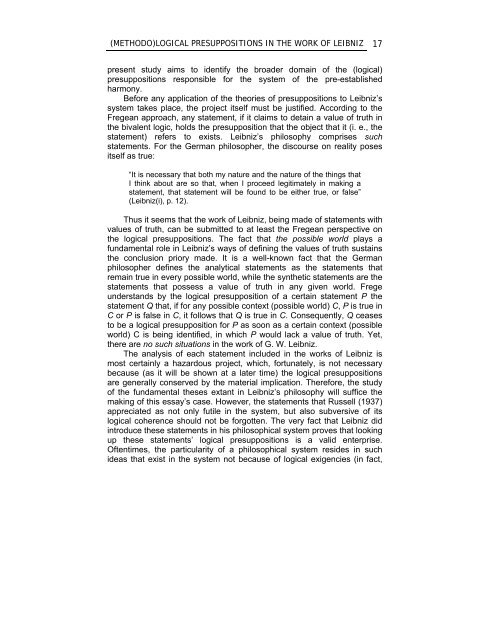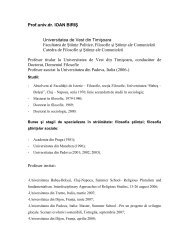analele universităţii de vest din timişoara annales universitatis ...
analele universităţii de vest din timişoara annales universitatis ...
analele universităţii de vest din timişoara annales universitatis ...
Create successful ePaper yourself
Turn your PDF publications into a flip-book with our unique Google optimized e-Paper software.
(METHODO)LOGICAL PRESUPPOSITIONS IN THE WORK OF LEIBNIZ 17<br />
present study aims to i<strong>de</strong>ntify the broa<strong>de</strong>r domain of the (logical)<br />
presuppositions responsible for the system of the pre-established<br />
harmony.<br />
Before any application of the theories of presuppositions to Leibniz’s<br />
system takes place, the project itself must be justified. Accor<strong>din</strong>g to the<br />
Fregean approach, any statement, if it claims to <strong>de</strong>tain a value of truth in<br />
the bivalent logic, holds the presupposition that the object that it (i. e., the<br />
statement) refers to exists. Leibniz’s philosophy comprises such<br />
statements. For the German philosopher, the discourse on reality poses<br />
itself as true:<br />
“It is necessary that both my nature and the nature of the things that<br />
I think about are so that, when I proceed legitimately in making a<br />
statement, that statement will be found to be either true, or false”<br />
(Leibniz(i), p. 12).<br />
Thus it seems that the work of Leibniz, being ma<strong>de</strong> of statements with<br />
values of truth, can be submitted to at least the Fregean perspective on<br />
the logical presuppositions. The fact that the possible world plays a<br />
fundamental role in Leibniz’s ways of <strong>de</strong>fining the values of truth sustains<br />
the conclusion priory ma<strong>de</strong>. It is a well-known fact that the German<br />
philosopher <strong>de</strong>fines the analytical statements as the statements that<br />
remain true in every possible world, while the synthetic statements are the<br />
statements that possess a value of truth in any given world. Frege<br />
un<strong>de</strong>rstands by the logical presupposition of a certain statement P the<br />
statement Q that, if for any possible context (possible world) C, P is true in<br />
C or P is false in C, it follows that Q is true in C. Consequently, Q ceases<br />
to be a logical presupposition for P as soon as a certain context (possible<br />
world) C is being i<strong>de</strong>ntified, in which P would lack a value of truth. Yet,<br />
there are no such situations in the work of G. W. Leibniz.<br />
The analysis of each statement inclu<strong>de</strong>d in the works of Leibniz is<br />
most certainly a hazardous project, which, fortunately, is not necessary<br />
because (as it will be shown at a later time) the logical presuppositions<br />
are generally conserved by the material implication. Therefore, the study<br />
of the fundamental theses extant in Leibniz’s philosophy will suffice the<br />
making of this essay’s case. However, the statements that Russell (1937)<br />
appreciated as not only futile in the system, but also subversive of its<br />
logical coherence should not be forgotten. The very fact that Leibniz did<br />
introduce these statements in his philosophical system proves that looking<br />
up these statements’ logical presuppositions is a valid enterprise.<br />
Oftentimes, the particularity of a philosophical system resi<strong>de</strong>s in such<br />
i<strong>de</strong>as that exist in the system not because of logical exigencies (in fact,




